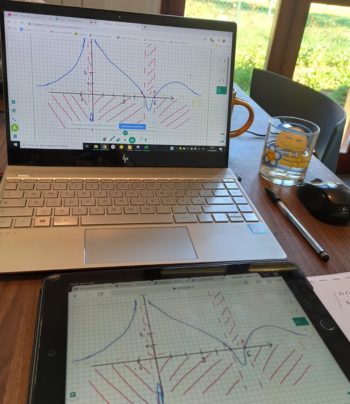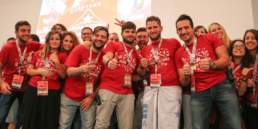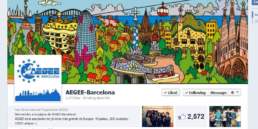The Coronavirus crisis is spreading across Europe at enormeous speed, every hour there are news. In the past days it also reached AEGEE: events were cancelled, the life of antennae has been affected and people have questions – for example about the upcoming Agora and Summer Universities. On 12th of March the situation escalated, when 22 locals wrote an open letter to AEGEE-Europe, in which they expressed their dissatisfaction how AEGEE is dealing with the Corona crisis. The GT asked Gabriele Nicotra about his opinion, since his antenna supported the letter and since his experience as former Network Commissioner, SU organizer and Agora organizer gives him a unique insight.
Golden Times: Gabriele, 22 Italian locals made a statement about the way AEGEE-Europe is dealing with the Corona crisis. Were you informed? What do you think about the statement?
Gabriele Nicotra: I was fully aware of it, besides the fact that Lorenzo Ligas and I are good friends, we share a lot in our vision of AEGEE, the EU in general and national politics. When the statement came up, Lorenzo asked me an opinion and, it goes without saying, I fully agreed with everything stated there. It’s an unfortunate situation indeed, it was not meant to point our fingers towards a non-existent responsible, we wanted just to know if we actually had our back covered, not only in AEGEE, but apparently we were wrong.
GT: What do the Italian locals want? Better crisis communication? Leadership? Empathy? Information about the handling of the Corona crisis in different countries? Information what the consequences for the antennae and their events are? Information about Agora Yerevan?
Gabriele: We want our situation acknowledged, we want to inform our network about what’s going on in our country and how stranded we feel. AEGEE has been going down in the last few years and many events have been cancelled due to Covid-19, but it’s evident that it just pushed things to go faster. If hypothetically there was no Corona, I sadly believe that those events would not have a massive participation or impact. If we take as example NWM Cagliari: it got cancelled before all of it, that’s already a symptom to me. And if we also consider Agora Yerevan, which has the patronage of all the major institutions in Armenia and which – exceptionally in AEGEE – will grant the best accommodation ever, doesn’t even reach 700 applications… It means that something out there is not really going smoothly, right?

GT: Let’s come back to that later. First, about Corona: Italy has been hit harder than any other country aside from China. Do we know why this is the case?
Gabriele: Well, I don’t have a degree in Medicine and I live literally on the other side of the country, far, far away from the epicenter. I guess that Italian belated measures, lack of judgement and a bit of selfishness did not help to restrain the outbreak. Now that we are finally coping with it, many other nations in the EU should learn from us, weird to say, I know.
GT: Indeed, Italy took the most drastic measure by shutting down public life, while other countries are still discussing what measures to take. Was the Italian government too radical? Or should the other countries in Europe have done the same?
Gabriele: It is a radical measure, but it is necessary. Our grandfathers were asked to go to war, they are asking us to stay at home with our family. True that we have a lot of hours on Call of Duty, but still. And yes, we haven’t lost our sense of humour!
GT: One might think there is not much union in the European Union. On Facebook some AEGEE members expressed their feeling that Italy is left to itself and there is not much solidarity – being it medical equipment now or help in the refugee crisis five years ago. Is that true? Is the European Union no solidarity union?
Gabriele: Well, I don’t see how the EU is backing us, really. We had a speech in Italian from the President of the European Commission. So far that’s it. Oh, we asked the European Central Bank to be more flexible, but the answer was no. They are asking us to face an extraordinary situation with an ordinary asset. Good job, Lagarde!

GT: How do we have to imagine life in Italy now? How is your life affected?
Gabriele: Have you watched “I am Legend”? “The Walking Dead”? Have you played “The Last Of Us”? “Resident Evil”? Well… Ok, to be honest, it is not so tragic, but it’s just the 4th day of quarantine. The best is yet to come.
GT: How does studying work now? I saw images on Facebook of online classes. Does it work?
Gabriele: I am facing the amazing world of online classes right now! It is so funny because my generation assumes that older people cannot even turn on a laptop, which is partially true, but I could see many of my brightest colleagues uncapable to make Microsoft Teams work, the main e-platform of the University of Catania. That’s amazing! Also, we don’t have the most stable internet networks, which means that a small class of 50 people goes smoothly, but if you attend a class with more than 100 people – I am doing marketing with nearly 200 people – it is almost impossible to keep up.

GT: How is the situation for the AEGEE antennae? How do they cope with cancelling local and international events? AEGEE-Bergamo even started to make online events…
Gabriele: I can talk about my antenna: we work really a lot with Erasmus students. A lot of them cancelled their stay in Catania and part of them were called back to their home countries. Besides, we had to cancel all our events, the ones from the Welcome Week too, and sadly even our well-known SU might be affected by the situation. We will keep you posted.
GT: In the AEGEE discussion some people expressed their feeling that there is not much European spirit visible in this situation. What’s your opinion: what should AEGEE with its pan-European network do?
Gabriele: It is easy to be a European when everything is going fine, but it’s in time of crisis – and in the long run – that you see if this Union is a thing or not. We feel left alone and aside. I was expecting more empathy, more sense and more nearness, but – nothing.
GT: We are in the promotion period for Summer Universities. Your antenna is one of the most famous SU organiser. What is your expectation? What will the crisis do to the SUs?
Gabriele: Our own SU in Catania can be jeopardized by the situation. The situation of Italy is apparently going to spread fast in other parts of Europe. The SUs will start already in June, which is only three months away from now. Even if we are as optimistic as possible I don’t think that in three months everything will be just fine. At this time of the year I should already be talking to the Municipality and University of my city, which is not doable in person and the Mayor or Rector of Catania have so many things to deal with right now that they won’t even bother about a small event of 40 people. Same goes for our partners. What kind of promotion am I supposed to do?
GT: Agora Yerevan is coming up. You were main organiser of an Agora in 2017. How do you see the current situation of Agora Yerevan based on your experience? What should AEGEE-Europe do? Make the Agora online? Cancel the event? See it through?
Gabriele: I can’t go through too many details, but Agora Catania could have been cancelled to the very last minute, but luckily none of this happened and the Agora was legen-wait-for-it-dary. If I were Armenak, aware of how many people are coming, what’s their home country, what’s the situation in those countries, which countries are closing the frontiers, how tourism is going in Europe in general, checking which airline companies are cancelling more and more flights and all the things connected to the logistics of the participants, I would cancel the event, better than in early May. I know I sound very negative, but a meeting of this size, no matter how small it is, is seriously against the standards that most European countries will adopt in the weeks to come. An Agora online is definitely a chance we haven’t seriously taken into account so far, maybe now it will be, who knows?
Map images by the John Hopkins University website.


